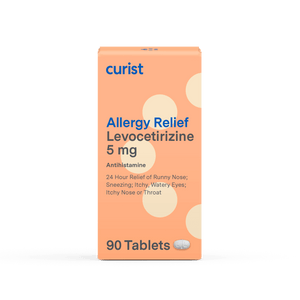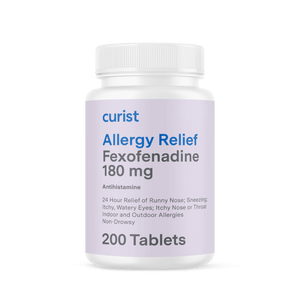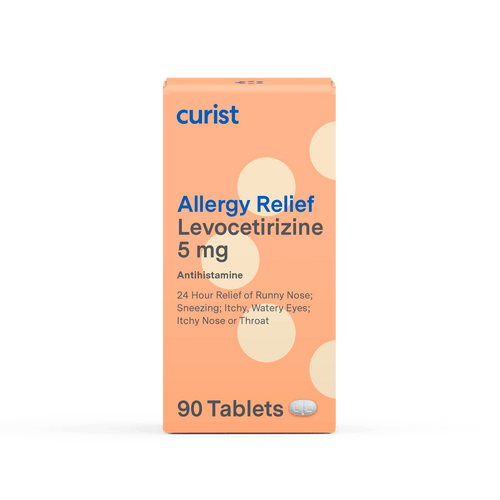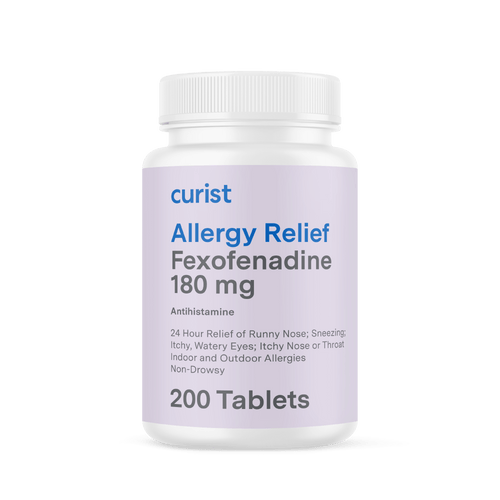Curist delivers over-the-counter medicines to your door at a fraction of the price of traditional brands. We hope everyone stays safe and healthy during this time.
Want To Enjoy A Picnic Allergy-Free? Try These Top Outdoor Allergy Tips
Spring and summer are such beautiful times with perfect weather where trees bloom, and flowers blossom. However, if you’re one of the millions of people with allergies, spring and summer can also mean more sneezing, congestion, and itching for you. If you have seasonal allergies - also called allergic rhinitis or hay fever- don’t let it stop from enjoying the outdoor joys during these beautiful months! Let’s “spring” into ways you can mediate your outdoor allergies.
What’s Causing My Outdoor Allergy Symptoms?
When people think of outdoor allergies, they assume the main culprit is pollen from flowers. Although that may be true, there many other sources of pollen such as:
- Trees
- Weeds
- Grasses
- Molds
The most common trees that cause outdoor allergies are birch, cedar, and oak. The most common weed allergy is from ragweed (you can learn all about ragweed here). Common grasses include rye grass, Bermuda grass, and Johnson grass. Common mold sources can be from fungus grown in many places such as under a pile of dead leaves in your backyard. To determine the main sources of your outdoor allergies, it is best to receive diagnosis from an allergist. Your allergist may recommend a skin test, which introduces small amounts of suspected allergens to your skin to see if the allergen produces an allergic reaction.
Why Am I Itchy After Sitting In Grass for A Picnic?
One source of outdoor allergies we identified above is pollen from different grasses. You may be allergic to grasses if you find yourself having allergy symptoms when you take a walk around the park, sit in the grass for a picnic, or if there’s just fresh cut grass around you. Common grass types that cause allergies are:
- Johnson Grass
- Rye Grass
- Bermuda Grass
- Sweet vernal grass
- Kentucky blue grass
- Timothy grass
- Orchard grass
What Are The Most Common Symptoms of Outdoor Allergies?
When you are exposed to outdoor allergens, like pollen or grass, your allergy symptoms may act up. Common allergy symptoms include:
- Sneezing
- Runny Nose or post nasal drip
- Stuffy nose with blockage/congestion
- Itchy eyes, itchy ears, itchy nose, or itchy throat
- Red or watery eyes
One helpful way to determine if you have outdoor allergies is to pay attention to your symptoms. Do your itchy eyes start after you’ve been outside for a while, like during a picnic or after a hike? How do you feel after staying indoors for the day? Does opening the windows (i.e. letting the outdoors inside) make your allergy symptoms worse? Some people even keep a daily activity and symptom log to find patterns and potential explanations for outdoor allergy symptoms.
Allergy Survival 101: Tips To Have A Picnic Allergy Free
Having FOMO (fear of missing out) from all your friends hanging out at an outdoor picnic? You can prepare in advance to make sure you can enjoy the outdoors too even if you have allergies.
- Find the right allergy treatment for you. Allergy medicine works best if you are consistent and take them on a daily basis, not just when you start to feel your symptoms emerge. Check out the Curist Allergy Collection for easy, affordable allergy treatment options, all available without a prescription.
- Use a picnic blanket. Especially if you are allergic to grass, try sitting on a blanket to avoid direct contact. Avoid fleece blankets because they can catch grass particles more easily, and be sure to wash your picnic blanket after use to avoid bringing allergens inside.
- Wash your hands before eating. Wash your hands or bring some hand sanitizer to use before eating food. This helps to limit the amount of pollen in contact with your face, and good for COVID-19 precautions too!
- Check the pollen counts. Before you go out, check the pollen count online to determine if the pollen count is extra high that day. It’s best to go out for a picnic on low pollen days. You can use this source to check the allergy forecast in your area.
- Try a saline rinse. If you are feeling extra congested the day of your outdoor activity, use a saline rinse to relieve any congestion before you head out.
- Eyeware. Wear glasses to keep the pollen out of your eyes, or use daily disposable contact lenses to avoid pollen accumulating on your lenses.
- Tissues. Be prepared! Bring a small travel pack of tissues just in case your nose is runny or if you need to blow your nose.
- Post-Picnic Routine. As soon as you get home, wash your body and hair, and change your clothes to get rid of any pollen. And a reminder to wash your picnic blanket!
- Sun Protection. Did you know that some people have sun allergies? Learn more with Curist's article about Sun Allergies vs Sun Poisoning vs Solar Urticaria.
As allergies pickup in spring and summer, be sure to pay attention to your symptoms and find the treatment tips that work for you so you can enjoy the beautiful outdoors!












